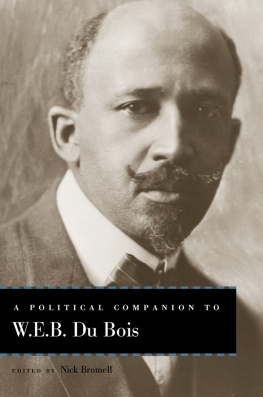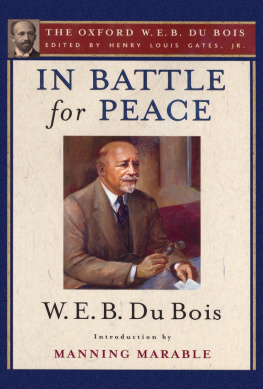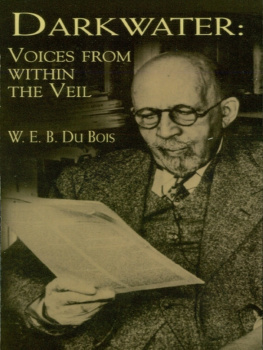Bromell - A Political Companion to W. E. B. Du Bois
Here you can read online Bromell - A Political Companion to W. E. B. Du Bois full text of the book (entire story) in english for free. Download pdf and epub, get meaning, cover and reviews about this ebook. year: 2018, publisher: University Press of Kentucky, genre: Politics. Description of the work, (preface) as well as reviews are available. Best literature library LitArk.com created for fans of good reading and offers a wide selection of genres:
Romance novel
Science fiction
Adventure
Detective
Science
History
Home and family
Prose
Art
Politics
Computer
Non-fiction
Religion
Business
Children
Humor
Choose a favorite category and find really read worthwhile books. Enjoy immersion in the world of imagination, feel the emotions of the characters or learn something new for yourself, make an fascinating discovery.
- Book:A Political Companion to W. E. B. Du Bois
- Author:
- Publisher:University Press of Kentucky
- Genre:
- Year:2018
- Rating:3 / 5
- Favourites:Add to favourites
- Your mark:
- 60
- 1
- 2
- 3
- 4
- 5
A Political Companion to W. E. B. Du Bois: summary, description and annotation
We offer to read an annotation, description, summary or preface (depends on what the author of the book "A Political Companion to W. E. B. Du Bois" wrote himself). If you haven't found the necessary information about the book — write in the comments, we will try to find it.
Bromell: author's other books
Who wrote A Political Companion to W. E. B. Du Bois? Find out the surname, the name of the author of the book and a list of all author's works by series.
A Political Companion to W. E. B. Du Bois — read online for free the complete book (whole text) full work
Below is the text of the book, divided by pages. System saving the place of the last page read, allows you to conveniently read the book "A Political Companion to W. E. B. Du Bois" online for free, without having to search again every time where you left off. Put a bookmark, and you can go to the page where you finished reading at any time.
Font size:
Interval:
Bookmark:

A Political Companion to W. E. B. Du Bois
A POLITICAL COMPANION TO
W. E. B. Du Bois
EDITED BY
Nick Bromell

Due to variations in the technical specifications of different electronic reading devices, some elements of this ebook may not appear as they do in the print edition. Readers are encouraged to experiment with user settings for optimum results.
Copyright 2018 by The University Press of Kentucky
Scholarly publisher for the Commonwealth,
serving Bellarmine University, Berea College, Centre College of Kentucky, Eastern Kentucky University, The Filson Historical Society, Georgetown College, Kentucky Historical Society, Kentucky State University, Morehead State University, Murray State University, Northern Kentucky University, Transylvania University, University of Kentucky, University of Louisville, and Western Kentucky University.
All rights reserved.
Editorial and Sales Offices: The University Press of Kentucky
663 South Limestone Street, Lexington, Kentucky 40508-4008
www.kentuckypress.com
Cataloging-in-Publication data is available from the Library of Congress.
ISBN 978-0-8131-7490-7 (hardcover : alk. paper)
ISBN 978-0-8131-7493-8 (epub)
ISBN 978-0-8131-7492-1 (pdf)
This book is printed on acid-free paper meeting the requirements of the American National Standard for Permanence in Paper for Printed Library Materials.

Manufactured in the United States of America.
| Member of the Association of |
For Kathleen Dodd
and in memory of William H. Dodd
Contents
Patrick J. Deneen
Nick Bromell
Charles W. Mills
Lewis R. Gordon
Anthony Reed
James Edward Ford III
Melvin L. Rogers
Nick Bromell
Robert W. Williams
Alexander Livingston
Arash Davari
Vijay Phulwani
David Haekwon Kim
Series Foreword
Those who undertake a study of American political thought must attend to the great theorists, philosophers, and essayists. Such a study is incomplete, however, if it neglects American literature, one of the greatest repositories of the nations political thought and teachings.
Americas literature is distinctive because it is, above all, intended for a democratic citizenry. In contrast to eras when an author would aim to inform or influence a select aristocratic audience, in democratic times, public influence and education must resonate with a more expansive, less leisured, and diverse audience to be effective. The great works of Americas literary tradition are the natural locus of democratic political teaching. Invoking the interest and attention of citizens through the pleasures afforded by the literary form, many of Americas great thinkers sought to forge a democratic public philosophy with subtle and often challenging teachings that unfolded in narrative, plot, and character development. Perhaps more than any other nations literary tradition, American literature is ineluctably politicalshaped by democracy as much as it has in turn shaped democracy.
The Political Companions to Great American Authors series highlights the teachings of the great authors in Americas literary and belletristic tradition. An astute political interpretation of Americas literary tradition requires careful, patient, and attentive readers who approach the text with a view to understanding its underlying messages about citizenship and democracy. Essayists in this series approach the classic texts not with a hermeneutics of suspicion but with the curiosity of fellow citizens who believe that the great authors have something of value to teach their readers. The series brings together essays from varied approaches and viewpoints for the common purpose of elucidating the political teachings of the nations greatest authors for those seeking a better understanding of American democracy.
Patrick J. Deneen
Series Editor
Introduction
Nick Bromell
W. E. B. Du Bois was not in any obvious sense a political theorist. He was a situated, activist intellectual who read philosophy but never saw himself as making theoretical contributions to political theory or to philosophy more broadly. Indeed, he could be sharply critical of theories and theorizing. However, as this volume and other recent work in the field amply demonstrate, his political thought can enrich, enlarge, and fundamentally transform the field. Indeed, it is precisely because his writings do not fit plainly within the canonical tradition of political thought that they have challenges and consequences for it.
As a sociologist, organizer, editor, historian, essayist, autobiographer, poet, and novelist, Du Bois changed his methods and his positions multiple times throughout his long career. Yet an obvious thread of continuity runs from its start to its close, and that is the question of race. I use the word question here advisedly, because Du Bois seldom (if ever) saw race as anything but a question, one that gave rise to many related questions. In his 1897 The Conservation of Races, he shared the assumption common at the time that whatever race might be, it was certainly something. But this something was for him a starting point, the launch of an investigation: The question, then, which we must seriously consider is this: what is the real meaning of race; what has, in the past, been the law of race development, and what lessons has the past history of race development to teach to the rising Negro people?1 About forty years later, he gave his 1940 book Dusk of Dawn the subtitle An Essay toward an Autobiography of a Race Concept, and he titled its fifth chapter The Concept of Race. This wording certainly signaled a shift from viewing race as something existent in the world to seeing race as an idea used to describe (or deform) the world. Yet even concept was perhaps too decided a term, for he went on to reflect that race had, as I have tried to show all sorts of illogical trends and irreconcilable tendencies. Perhaps it is wrong to speak of it as a concept rather than as a group of contradictory forces, facts, and tendencies.2
For Du Bois, the investigation of race was never an isolated inquiry. As he wrote in Darkwater: There can be no permanent settlement of our problems of capital and labor, voting, women and children, which does not take into serious account the influence of color caste on these questions. And, in turn, the color line shows itself, not as a separate problem, but directly as a problem of work, rule, sex, and training.3 As we would say in shorthand today, race cannot be disentangled from gender, sex, and class. And vice versa. Pursuing this single insight relentlessly for more than sixty years, Du Bois anticipated two major developments in more recent historical and political scholarship. One is that race is a constitutive element of Western modernity, a thesis C. L. R. James, Eric Williams, Paul Gilroy, and (subsequently) many others have elaborated. Another is that race is constitutive of US democracys principles and its practice, as Edmund Morgan, David Roediger, Rogers Smith, and Dana D. Nelson among many others have shown. Finally, alongside these a third development is now under way. Well represented in this volume, it argues that race lies at the very heart of the Western philosophical tradition, including the branch of it we identify as political philosophy or political theory. Du Bois himself did not, as far as I know, explicitly anticipate this insight, but all of the essays in this volume argue that it is suggested in many places and in many ways throughout his immense oeuvre. Perhaps more decisively than any other single black political thinker, Du Bois challenges what Adolph Reed, in one of the first major books on Du Boiss political thought, calls the propensity to define the history of American political thought as a narrative that marginalizes or excludes both race as an issue and nonwhites as participants.4 This volume, therefore, seeks to work against what Lawrie Balfour, in another indispensable book on Du Bois, describes as political theorists reluctance to treat race and racial injustice as fundamental to the study of modern democratic life.5
Next pageFont size:
Interval:
Bookmark:
Similar books «A Political Companion to W. E. B. Du Bois»
Look at similar books to A Political Companion to W. E. B. Du Bois. We have selected literature similar in name and meaning in the hope of providing readers with more options to find new, interesting, not yet read works.
Discussion, reviews of the book A Political Companion to W. E. B. Du Bois and just readers' own opinions. Leave your comments, write what you think about the work, its meaning or the main characters. Specify what exactly you liked and what you didn't like, and why you think so.











